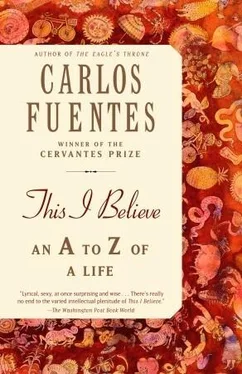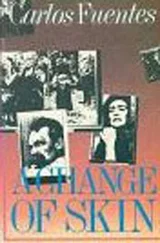They had three sons: the eldest, Carlos Fuentes Boettiger, made a name for himself very early on as a poet. Tall, blond, and slender, he was the favored disciple of the poet Salvador Díaz Mirón. At the age of twenty-one he went to study in Mexico City, never to return, for he fell victim to one of the typhoid epidemics that in those days swept through Mexico, backward, unhealthy, and chaotic country that it was. But the family enjoyed many years of happiness, first in Veracruz, where my grandfather was the manager of the National Bank of Mexico, and later on in Jalapa where he held the same post and watched his health slowly deteriorate, having succumbed to a progressive paralysis that would eventually leave him mute, confined to a wheelchair with no discernible expression on his face — like old Villefort in The Count of Monte Cristo— other than that afforded by his monstrous eyebrows. Through my father I learned that this ancient man, whom I did get to know, had been a voracious reader in Spanish, French, Italian, and English. From my grandfather Rafael I still have some beautiful old editions of Dante, Swift, and Walter Scott, printed in the nineteenth century in such a tiny typeface that they must have required a magnifying glass to read. My father used to tell me how every month my grandfather took him by the hand to the port, in anticipation of the mail boat from Liverpool and Le Havre that arrived at Veracruz with the illustrated magazines —The London Illustrated News, La Vie Parisienne— and novels that were in vogue at the time: by Pierre Benoît, Alphonse Daudet, Pierre Loti.
Having lost all hope of her husband’s health improving, my determined grandmother Emilia Boettiger moved to Mexico City, where she established a guesthouse high up on the corner of Mérida and Álvaro Obregón that was frequented by many Veracruz residents passing through the capital. They followed the exodus of many families who, spurred on by the devastations of the revolutionary movement, had come to Mexico City in droves from the provinces. A woman of extraordinary energy and will, my grandmother Emilia took care of her incapacitated husband, reigned over a jarocha kitchen of delicious Veracruz cuisine such as the beef dish known as manchamanteles, the rice and black beans known as moros y cristianos, fried plantains, ropa vieja, and octopus in its ink. My aunt Emilia, completely dominated by her mother’s forceful will, assisted her in her tasks, feeling herself to be responsible, until the day she died, for looking after her parents even more than for looking after herself. Just like in the novels of the day, she sacrificed her own happiness in order to fulfill her filial duties.
My father, Rafael Fuentes Boettiger, on the other hand, left behind the province of his childhood and youth in order to focus his energies on a vocation that had inspired him ever since he had first visited the port with my grandfather to watch the mail boats come into town. A precocious reader from a very early age, he would stage dramatic readings, assuming D’Artagnan’s role in the adaptation of The Three Musketeers he would perform in the massive gymnasium of Veracruz’s bank. At thirteen, as a cadet in the Jalapa preparatory military academy, he departed for Veracruz to take part in the defense of the port that had been invaded by U.S. marines. He did not get far, though — the occupation came to an end soon afterward. Nor did he get very far when, at the age of nineteen, he decided to join Fernando Soler and Sagra del Río’s theater company and surreptitiously escaped Jalapa one day. My grandfather was waiting for him at Córdoba station and dragged him off the train by his ear.
As a young lawyer and instructor in the law department at Veracruz University, my father entered the Mexican Foreign Ministry at the age of twenty-five as a lawyer for the Mexican and American Mixed Claims Commission, which had been created to address the grievances of U.S. citizens affected by the wartime activity along the northern Mexican border. He met my mother on a tram, one of those old yellow relics that in those days wove through the streets of Mexico City. They were married and left the country when my father was appointed to his first diplomatic post, in Panama, where I was born nine months later on November 11, 1928.
We were a happy family, if, to someone like Tolstoy, perhaps not a terrifically interesting one. But who cares about being interesting if unhappiness is the price you have to pay? My sister Berta was born in Mexico in 1932 and we spent our childhood in the Mexican embassies in Washington, D.C., Santiago de Chile, and Buenos Aires. This itinerant, mutant diplomatic life—“gypsies in tuxedos,” as my father called us — clearly brought us together, but so did the mutual respect and constant affection that were the essence of our life together. The great Mexican writer Alfonso Reyes had this to say about my father: “He was an essential man, no froth.” That frothless man arrived at the Mexican embassy in Rio de Janeiro one day and found Reyes attending to his administrative tasks, deciphering cables and filing news clips. “I’ll look after the office, Don Alfonso,” my father said to him. “You concentrate on your writing.” It was in the company of another great ambassador, Francisco Castillo Nájera, the Cárdenas government’s envoy in Washington, that my father honed his rigorous work ethic and close attention to detail — two qualities for which he became renowned during his years as the chief of protocol for the Ministry of Foreign Affairs, and then at embassies in Panama, the Hague, Rome, and Lisbon. Leaving diplomacy and entering retirement killed him. Back in Mexico, he yearned for his driver, his reports, his daily diplomatic agenda, all the essential elements of his life, and slowly faded away, disconcerted, wearing a poignant expression of absence and nostalgia.
I owe my basic literary education to him. His encouragement and his tacit homage to his dead brother’s unrealized potential touched me deeply even as a small child. He was a man of good humor, tenderness, punctuality: a good example. My mother, at his side, lived a never-ending, real-life love story with him. The very day he died, my father did two things: he tried on a new suit and he sexually harassed my mother. She had always represented the dignity and formality of the home, the sense of security that beneath the travelling, the forced adaptations to new schools, learning new languages and new customs, there lay a principle of seriousness, rectitude, and even impatience with ambitious, arriviste, or intriguing people. Yet she did not lack a sense of humor, either. She was an excellent poker player, and I remember watching her as she trounced the revolution-era generals who, to their chagrin, had bet against her during the games they played at embassy dinners. And to the day of her death, achy but every bit herself at the age of ninety-four, she confessed to me: “I have one disappointment in life. I would have liked to pilot a plane.”
What she piloted marvelously was our family Buick every summer en route from Washington to Mexico, enduring the heat, the racial discrimination in Texas (“No dogs or Mexicans allowed”), and the curves at Tamazunchale. This practical skill more than compensated for my father’s dreamier, somewhat dispassionate disposition. My mother was the one who ran the family home, put together the schedules, had clean clothes ready at all times, and did the sums on the car, the schools, the apartment. She thought about the future, always much more than my father, who was disciplined and punctual to a fault but also — and bravo to him — a dreamer, a tender soul, a man utterly without material ambition. He could be emphatic and intolerant, and he certainly was with me: I still wince with pain at the memory of the spankings he gave me. And that was how he was with every display of tardiness, lack of discipline, or rudeness. That was how he was with arrogant or corrupt Mexican politicians. I still remember his head-on confrontation with Gonzalo N. Santos, the political boss of San Luis Potosí, over a question of disrespect. I remember his decision to resign from the City Hall of the Mexican capital during the administration of Abelardo Rodríguez, horrified at the offers of mordidas (graft) and violations of Mexican law. He had lasted two months in the job. I think he will spend eternity in heaven.
Читать дальше












